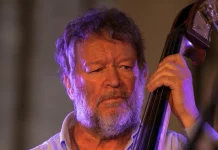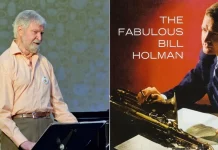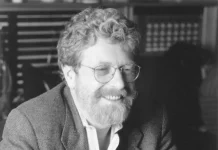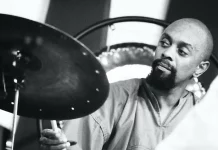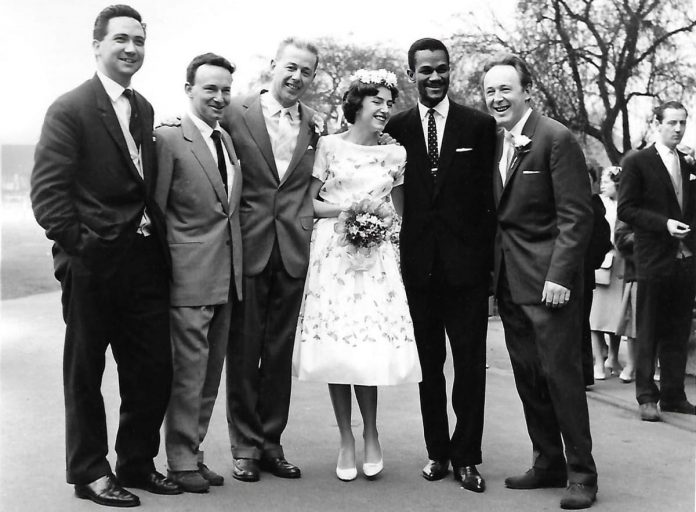
It really seemed as if Chris Barber would go on forever. He was still playing trombone and leading his Big Jazz and Blues Band at the age of 87, not just in this country but on regular tours of Holland and Germany where he was extremely popular. An accident about two years ago prevented him going on stage to play and his band fulfilled the engagement without him. It was rumoured that he had shaken off his incapacity and wanted to go on and play but had been counselled not to. Shortly after this incident he announced his retirement. He died 2 March at the age of 90, having suffered from dementia for the past two years.
Chris Barber was evacuated from London during World War II and began collecting 78 records of New Orleans jazz musicians. He bought his first trombone for £5 from Humphrey Lyttleton’s trombonist and began playing after the war. He was already recording in the late 1940s but began to make a name for himself when he formed a co-operative jazz band with Monty Sunshine in 1953.
They put Ken Colyer in as nominal leader as his authentic New Orleans style on cornet was extremely popular. It also helped publicity that Colyer had notoriously just returned from New Orleans from where he had been deported following landing up there as a “jumped ship” seaman with no visa. It didn’t work though – Colyer was too volatile and abrasive and also attempted to sack members of the co-operative band. Barber told Colyer he had to go, and he was replaced by Pat Halcox who remained a member for 54 years.
Barber’s band became increasingly successful and popular and was one of the first of the New Orleans styled bands in the trad boom of the late 1950s and 1960s. They began to have hit records: Petite Fleur, featuring Sunshine’s clarinet, made the UK chart at number 2 and was number 5 in the American top hundred. Another big success was the trio within the band, a skiffle group playing American folk and blues. They recorded Rock Island Line with Lonnie Donegan, Barber’s guitarist and banjo player, which started a craze all over the country to form skiffle groups. Among those inspired were two youngsters in Liverpool called John Lennon and Paul McCartney. On that recording Barber played double bass, which he had studied at the Guildhall School of Music and Drama along with trombone. Donegan went on to become a successful solo performer.
Barber and his band became increasingly successful, particularly when they hired a singer from Northern Ireland named Ottilie Patterson. Her deep voice and expressive style reminded many people of Bessie Smith. The two married shortly after she joined the band and were together until the 1980s, when they divorced. The band played small jazz clubs and pub back rooms all over the country and gradually expanded to playing in large venues in the UK, Europe and from 1959, the USA. Barber became famous for exporting traditional jazz back to the country where it originated.
Traditional New Orleans jazz was Barber’s first love but unlike his contemporaries Acker Bilk and Kenny Ball he was forever looking into other forms of jazz. He became interested in the work of people like Joe Harriott, Charles Mingus and Joe Zawinul. Blues was always a favourite and he toured with many of the early blues men. He collaborated with Muddy Waters, Sonny Terry and later Dr. John. He loved the music of Duke Ellington and always featured many of Duke’s compositions at his concerts. His later shows in the 1990s and through the first 20 years of the 21st century always featured music from the swing era and even modern, bop-based modal music. Late in his career the concerts always had a modern jazz feature, most notably a quintet from within the big band playing Miles Davis’ All Blues. His sidemen played this with skill but it was noticeable that although Chris gave it the big build up in his introduction, he never played in the group himself. He still played plenty of trombone consistently even though he employed a second solo trombonist in the big band. He was given the OBE in 1991.
When I first interviewed Chris for a newspaper feature some 15 years ago, I still thought of him as being in the thick of the London scene, playing there at familiar haunts and most likely still living there. It was quite surprising to find myself driving through a small Berkshire town near where I lived and out to a little village about two miles beyond. I went on and through the village and then turned right into a narrow, winding track that led up into a good-sized estate and parked outside a large, imposing house. Chris greeted me at the door and showed me into a small office to the left of the hall. Inside it was quite sparse but with a good view of the surrounding parklands and woods. We talked for a long time and it was never difficult to think about what to ask him next. He talked continuously and endlessly for as long as anyone was prepared to listen. He told me how difficult it had been to remove Ken Colyer from the early band, but he had needed to be strong and determined. After Colyer’s departure the band took off and never looked back. And Barber’s musical relationship with Halcox lasted 54 years! All this was delivered in a constant stream of often unclear tones and rapid speech. He always spoke so quickly and in so jumbled a fashion that it was difficult at times to understand what he was saying. He did the same on stage, as one of his sidemen once observed when making an introduction in his absence. Not for the first time I wished he could have slowed down a bit. Even so he was one of the most enlightened and successful bandleaders in jazz and we are unlikely to ever see his like again.
Chris Barber married four times. The marriages to Naida Lane, Ottilie Patterson and Renata Hilbich all ended in divorce. He is survived by Kate, his fourth wife, and two children from his marriage to Renata – Christopher Jr and Caroline.
Donald Christopher Barber was born in Welwyn Garden City, 17 April 1930 and died 2 March 2021.
After this article was published, Rebecca Evans and Nick White of the new Big Chris Barber Band management wrote to say that the Big Chris Barber Band came into existence in 2000 not 2010 as stated, and the 2019 tour did take place but without Chris.
They continued: “This is just to let all interested parties know that, following Chris Barber’s passing and in accordance with his wishes, the Big Chris Barber Band will be continuing to perform and is under new management with effect from January 12th 2021.
“The change of management is at the express wish of Chris and the Barber family and the new management have the exclusive right to use Chris Barber’s name for the purposes of performance.
Any enquiries regarding the band should be addressed to Rebecca Evans +44 (0)777 396 0168, email becky@resolutionsinmusic.co.uk.”

